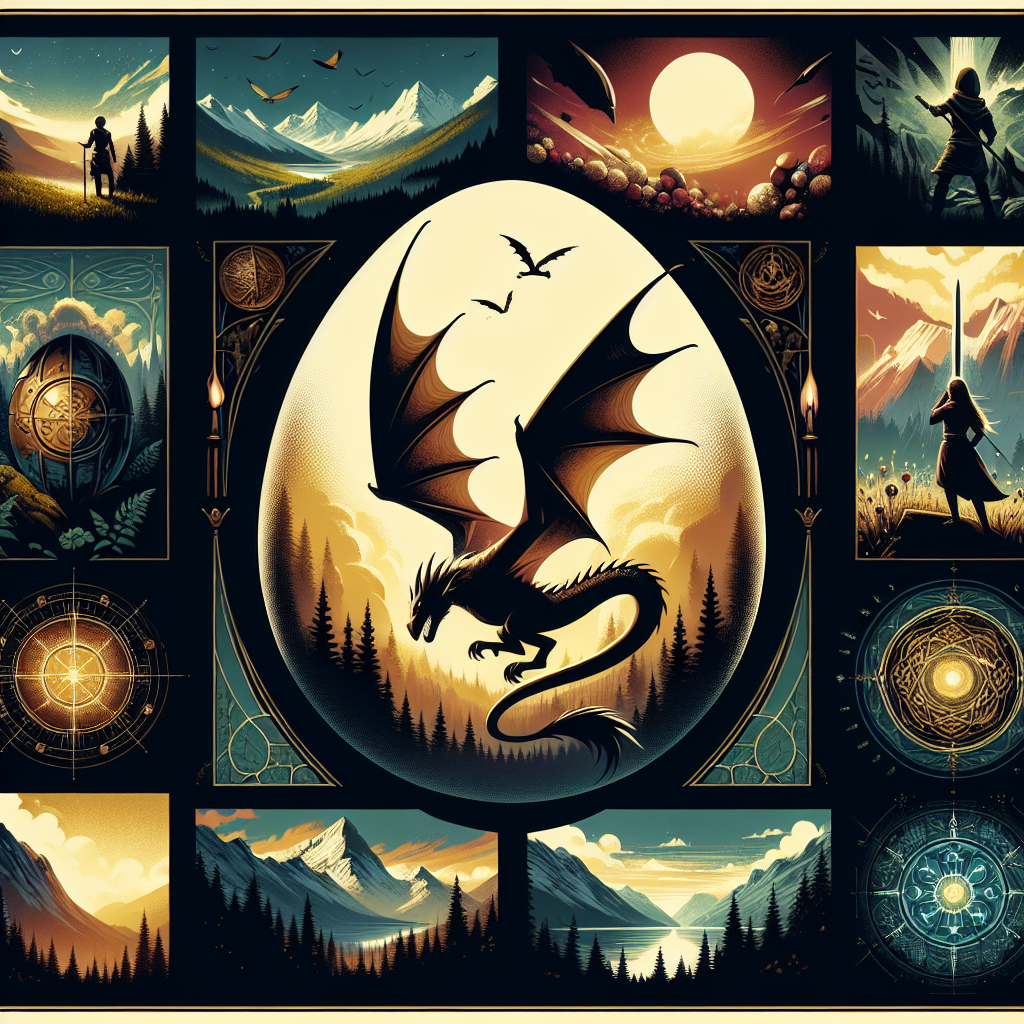Discover the Magic: Why Eragon by Christopher Paolini is a Must-Read Fantasy Adventure
Introduction: A Literary Phenomenon
Christopher Paolini’s debut novel, Eragon, has long been hailed as a modern classic in the realm of young adult fantasy literature. First self-published in 2002 when the author was just 19, the book quickly garnered attention for its ambitious world-building and compelling narrative, leading to a deal with Alfred A. Knopf and a spot on the New York Times Best Seller list. As the first book in The Inheritance Cycle, Eragon sets the foundation for a saga that has captured the imaginations of millions. The novel’s significance extends beyond its commercial success; it represents a beacon of youthful creativity and a testament to the rich possibilities of fantasy fiction.
Main Themes: The Heart of the Adventure
At its core, Eragon explores timeless themes such as the hero’s journey, destiny, and the battle between good and evil. One of the most captivating aspects of the novel is its exploration of personal growth and responsibility. Eragon, the titular character, begins as a simple farm boy whose discovery of a mysterious blue stone—later revealed to be a dragon egg—propels him into a world of magic and conflict. This transformation from boy to hero underscores the theme of destiny and choice, illustrating how one’s path is shaped as much by personal decision as by fate.
Another predominant theme is the nature of power and its moral implications. Through Eragon’s relationship with his dragon, Saphira, and his encounters with various allies and enemies, Paolini delves into questions of authority, the ethical use of magic, and the responsibilities that accompany great power. These themes resonate with the reader as they mirror societal reflections on leadership and integrity.
Character Development: A Journey of Growth
The character development in Eragon is robust and layered, with the protagonist’s evolution being the most discernible. Eragon’s journey from innocence to maturity is enriched by his bond with Saphira—an emblem of wisdom, strength, and companionship. Their relationship serves as the emotional core of the novel, highlighting themes of trust and mutual respect. Saphira herself is not merely a pet or weapon but a fully realized character with her own personality, ideas, and growth.
Secondary characters, such as Brom, Arya, and Murtagh, add depth and complexity to the narrative. Brom, as Eragon’s mentor, embodies the archetype of the wise old man while revealing surprising layers of his past, particularly in key chapters such as the Raid on Yazuac, where he demonstrates both his cunning and vulnerability. Arya introduces elements of mystery and grandeur, her character shrouded in the intrigue of her elfin origins and her role in the greater struggle against the tyrant King Galbatorix.
Narrative Techniques: Crafting the Epic
Paolini’s writing style in Eragon is notable for its vivid descriptive language and immersive world-building. The author skillfully crafts the land of Alagaësia, employing detailed descriptions that bring its landscapes, cultures, and history to life. The use of imagery is particularly effective in key chapters like "The Miracle at Daret" and "The Palancar Valley," where the settings reflect the novel’s thematic concerns and character arcs.
The narrative structure follows a classic three-act format, familiar to readers of epic fantasy yet infused with a freshness derived from Paolini’s youthful perspective. His use of foreshadowing and suspense maintains a compelling pace, encouraging readers to delve further into Eragon’s adventures.
Cultural and Historical Reflections: Beyond the Pages
Eragon occupies a unique place within the landscape of early twenty-first-century literature. In an era where fantasy was witnessing a renaissance in both literature and film, Paolini’s work contributed to the genre’s resurgence among young audiences. The parallels between Eragon and other fantasy classics, such as J.R.R. Tolkien’s The Lord of the Rings and Ursula K. Le Guin’s Earthsea series, are evident in its epic scope and philosophical undertones, yet Paolini’s youthful voice and vision infuse the novel with a distinctive charm.
The way Eragon handles themes of tyranny, freedom, and resistance also reflects broader societal conversations about power and governance, resonating with readers during a time of global political change. Through the lens of fantasy, Paolini addresses these universal issues, providing a narrative that is both escapist and reflective.
Legacy and Influence: A Lasting Impact
The impact of Eragon on popular culture and literature is multifaceted. Its success paved the way for future young writers eager to explore the fantasy genre, inspiring a new generation to embark on creative endeavors. The novel’s adaptation into a feature film in 2006, despite mixed critical reception, further cemented its place in the cultural zeitgeist.
Eragon‘s legacy is evident in the continued popularity of The Inheritance Cycle and its influence on subsequent fantasy works. Readers and writers alike appreciate its blend of familiar tropes and fresh storytelling, demonstrating the enduring power of high fantasy to captivate and inspire.
Conclusion: Reflective Takeaways
As we revisit Eragon today, it prompts us to consider the enduring appeal of fantasy tales and the ways in which they reflect our own journeys. How does Eragon’s story of growth and discovery resonate with the personal challenges we face? In what ways does the theme of choosing one’s destiny inspire us to make conscious decisions in our lives? Moreover, what responsibilities come with any power we possess, and how do we wield it ethically?
Ultimately, Eragon invites readers to explore not only the magic of Alagaësia but also the magic within themselves. In doing so, it remains a relevant and transformative piece of literature, reminding us of the power of stories to illuminate the path ahead.
Got more questions? Our personalized Book Explorer AI assistant is here to help. Click here to start a conversation!
[Advertisement]
Looking to find deeper meaning in the books you love? Discover how ANY book relates to positive biblical principles with Books and Scripture GPT‘ from BGodInspired.com. Click here to explore the connections that might surprise you!
[Advertisement]

